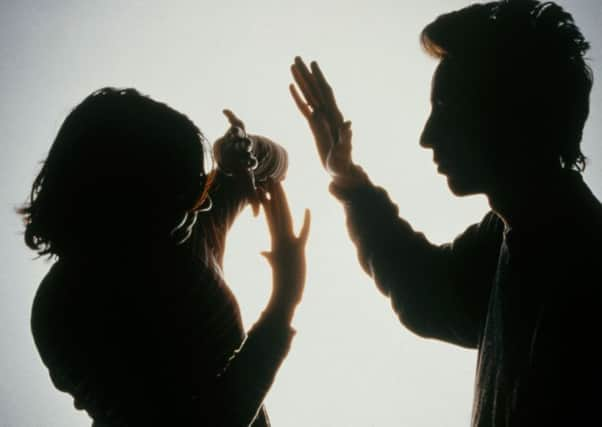FEATURE: Behind closed doors


Three women and a very small man sit around a table. It’s the ladies’ seminar room at one of Derbyshire’s Probation Service offices. One of the women is Sharon, 54, who was released from prison a few years ago. She’s strong, savvy, and talks ten to the dozen. You’d never believe she was the victim of domestic abuse for years.
Kindly taking the time to talk to us, Sharon is keen to help other female offenders in a similar position as she was. There is a clear connection between offending and abuse – up to 80 per cent of women in prison may have been victims, and the women’s group at the service is raising awareness and doing its own work to change perceptions.
Advertisement
Hide AdAdvertisement
Hide AdSharon, whose real identity we have kept hidden for her protection, was on probation until 2012 after serving in prison, she says alongside her husband on tax charges.


She says: “A lot of women come into the group who have suffered physical, mental and sexual abuse. It all boils down to the same thing, women that are suffering through no fault of their own.”
For Sharon, her abuse started when the family came under a lot of pressure, with an ill child and a death in the family.
“My husband used to come in and I could tell as soon as he came through door what mood he were in, and the slightest little thing would kick him off. It would be alright one minute and change the next.
Advertisement
Hide Ad“I didn’t want to be in the house with him but I was anxious to go out. If I did he wanted to know where I’d been. If he was on nights I’d stay up and clean the house because I was frightened that he’d find fault with everything I did. He threatened to have my kids taken away and said it was my fault. He was mentally controlling, and physically violent as well. He used to rip doors off, smash the house up. I had my children to think of and I didn’t want them to see it, but they knew what was going off because they could hear it.
Advertisement
Hide Ad“The mental stress it put on me – depression, anxiety, I had a nervous breakdown. My youngest daughter was in hospital, my husband was working night shifts and overtime, and I was working as well. It was mental stress on all the family,
“My parents had a loving relationship so I couldn’t understand why I deserved this, I thought I must have done something wrong.
“At home, if you did something wrong you got a smack, simple as that.”
Advertisement
Hide AdAnd it’s perceptions like this that need to change, she adds.
“Years ago if you called the police they wouldn’t do anything, because you were married and it just was a domestic.
Advertisement
Hide Ad“The older generation see it as ‘you made your bed, you lie in it’.”
And it’s not just the physical abuse, but the mental and emotional control, with guilt complexes and men making their partners feel like they deserve the abuse they’re receiving, to name just one example – up to the constant, exhausting fear of your partner, says Sharon.
Advertisement
Hide Ad“A black eye will go, but the emotional trauma is far worse.
“You don’t want to go back to that house because you don’t know what you’re going into, it’s like chucking yourself into a volcano.
“You find you’re putting a pound aside here and there because you don’t know when you might need a taxi. You’re looking for ways out.”
Advertisement
Hide AdAnd all too commonly abusive men control their partner’s every move, and dictate every aspect of their lives.
Advertisement
Hide Ad“I’ve seen girls saying ‘do you mind if I just pop down the shops?’.
“You’re a human, and you’re allowed to go out, you don’t have to ask to go to the shops, or to go to the loo.”
A much stronger person than before she went into prison, Sharon was able to do something about her circumstances.
So how did she escape after 15 years of abuse?
“I didn’t,” she said. “I’m still with him. But I was able to put my foot down and I told him I wanted a divorce.
Advertisement
Hide AdAdvertisement
Hide Ad“ I said I’m not doing it anymore. How can you hold out your hand and love me with one and hand and hit me with the other? By not telling anybody and speaking out, I was giving him cover. I had come into a relationship as a very strong character and he was very shy. I was a sponge full of knowledge and he squeezed every bit of confidence out of me and shrunk me down.”
So, in what may seem to others like a miracle, she was able to forgive her husband, and while taking back her strength in the relationship the abuse has now stopped entirely, she says.
I’m left wondering what kind of saint she must be to forgive someone like that.
And in what may seem like a miracle to others, the relationship changed, and Sharon was able to forgive her husband.
But how could she forgive the things he’d done?
Advertisement
Hide Ad“There’s another side to him,” she said “He would do anything for me and he’s caring.
Advertisement
Hide Ad“He’s looked after his mother since he was six years old. But he thought once the door was shut he could let his stress out under his own roof and I was the main target.”
Sharon escaped domestic abuse, but she didn’t have to run from it.
She was able to stand her ground and change her situation.
Not all women are so fortunate, and the group hopes they can help other women find the strength to even reach out for help.
Challenge 35: Combating the cycle of abuse
Advertisement
Hide AdDomestic violence accounts for 16 per cent of recorded violent crime although only a minority of victims report domestic violence to the police.
The average number of instances until a woman seeks support is 35, and charities like Women’s Aid are trying to get that number down by helping women recognise their situation, and give them adequate access to seek help.
Advertisement
Hide AdPrincipally in the fight to help women report any abuse sooner, it is helping them identify their situation when many do not even know they are being abused.
Senior probation officer Kat Johnson says: “People get trapped in relationships and become totally dependant on them even though they’re abusive.”
Advertisement
Hide AdAnd the women’s group opens a lot of people’s eyes, adds Sharon: “When people start talking about their home life they recognise something they didn’t realise, that they’re being abuse.
“If you’re brought up with abusive parents it’s very likely you’ll see it as normal.
“That cycle needs to be stopped.”
Equally is the deep-running connection between abuse and offending. Female offenders are far more likely to be in abusive relationships – depending on different research, between 50 and 80 per cent of women in prison have experienced domestic or sexual abuse.
Advertisement
Hide AdSharon tells us: “I’d say seven out of 10 of the women I’ve encountered are suffering with abuse in some way. They may not even realise that being forced to have sex is rape.
Advertisement
Hide Ad“I had a girlfriend who was prostituting herself for drugs money – for him. I met a lot of women who said they were in trouble their boyfriends forced them to shoplift, or they had no money because he spent it on drugs, or they’d been abused by their own fathers and got to the stage they were living on streets and didn’t want to steal or to sleep with people for money, but they had no alternative.”
Kat adds: “People can be financially controlled and might go out and shoplift to provide for their family, and in some controlling relationships the female may be drug dependent and their partner is funding their substance misuse to that they stay in the relationship.”
Now the Probation service is helping its women’s group to tackle issues that affect their lives, and the group has been raising money and awareness with a sponsored 35-width swim, 3.5 mile walk and 35 kilometre bike-ride.
Ms Johnson added: “The group gets a lot out of working together like this. The discussion about domestic abuse had touched so many of them we wanted to channel all the positive energy and do something worthwhile, so with such a negative side to offender support it’s wonderful to see something like this.
Advertisement
Hide AdAdvertisement
Hide AdAnd probation officer Rachel Wood said seeing the group work together was what made the job worthwhile. “It’s good to see people reach their full potential, get the confidence to grow and hopefully not come back. You see people go on a journey, sort themselves out and then become role models to other people.
“We need women to know there are services out there,” she stressed.
To seek advice call Derbyshire Domestic Abuse on 0808 2000 247 or Derbyshire Domestic Abuse Violence and Sexual Abuse Service on 01246 540 444.